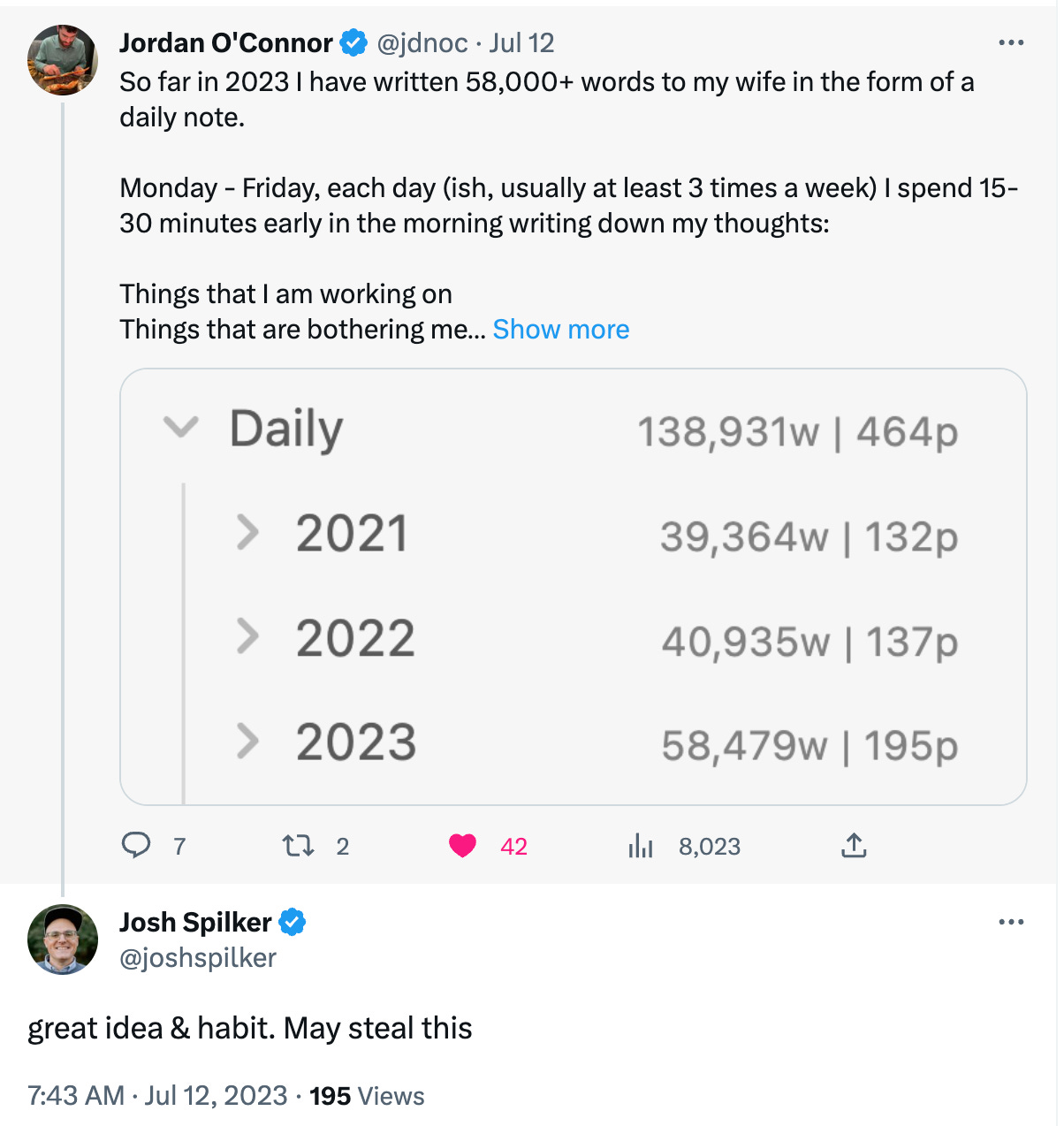Hello to all the new readers out there 👋
I’m Josh Spilker and this is a newsletter for online writing, creativity, and culture.
A helpful productivity practice is asking daily standup questions.
Popularized by engineering teams, standup questions give you a quick pulse on how work is progressing.
You can also use similar questions in other areas of life, too. If you’re unfamiliar with the concept, keep reading and you’ll catch on.
At The Day Job
What did you do yesterday?
What are you working on today?
What are the blockers in your way?
These are the 3 traditional daily standup questions, a software engineering concept that has spread to basically all levels of companies, mostly tech companies.
Some teams estimate time to their workload, and go through a huge checklist in their project management platform, but you get the concept.
These were traditionally called “scrums” and were refereed by a scrum master. It was part of agile software development, though the rules hae loosened over the years.
Another helpful way to think of these is as “status updates” but for work.
I’ve written about this concept a lot in a professional sense, mostly in the form of “What is…” articles, so I won’t bore you with that now. If you want to find more, Google it lol.
At the Leisure Hustle
Use the daily standup questions to get a pulse on your leisure hustle (or side project). They’ll create more personal responsibility.
What did you do yesterday?
What are you working on today?
What’s next? / What’s in my way?
Modify them to fit your the timeline of your work:
What did you do last time?
Answer: Wrote 1000 words
What’s the next goal to hit?
Edit last draft.
What’s next?
Send to friends for feedback
Submit to publication.
If there are days or (weeks? months?) between your creative, side project sessions, then you may want to fill that out at th end of your creative sessions to be more forward thinking.
What did I do today?
What am I doing next?
What’s in my way?
With Friends
During the pandemic, a friend of mine started something similar in a Slack group of friends that goes something like this:
• High of the day
• Low of the day
• Ways you’ve seen God’s faithfulness
If you’re not a Christian or religious person1, you could substitute that last one for something you may be thankful for.
Honestly, we’ve fallen off the wagon a bit with this over the past few months, but maybe we’ll get back into it.
With Children
With my children, this formula works:
What was the sunny part of your day?
What was the stormy part of your day?
What is something you’re looking forward to?
This is part of our normal conversation at the dinner table. It gets them talking and goes beyond the “How-was-your-day?-Fine” routine.
As 7 and 9-year-olds they offer really great answers, though we started these questions with them back in preschool.
With Your Spouse
With my wife, it really ends up being all of these questions, right?
Maybe not in a row or as formally, but I try to keep them in mind in our daily conversations.
Some variation of what did you do today, and what are you frustrated by (not as harsh as blockers) give me a good perspective. It also opens up opportunities for her to tell me if I’m unintentionally standing in her way of accomplishing something, going somewhere, or making something happen.
Ways in which we’ve seen God be faithful was actually a therapy question, and asking what she’s looking forward to helps me know about not only plans but hopes.
BTW, I want to try and implement this practice as well. It’s one of those newfangled long tweets, so click through for the whole thing:
A Helpful Practice
Overall, it’s been helpful to use these questions to reflect and to create better relational bonds.
I do them quite often in my regular workday, less often with my personal writing.
However, when I do them especially for my creative projects, it does flow nicely into creating a running task list, that I can then come back to for the next time I write.
More Things:
The Case for Magazines by John DeVore at Medium.
On not taking advantage of knowlege at Medium.
How novellas became novels by Lincoln Michel on Substack.
Really long piece about the nature of Twitter and Threads by Eugene Wei.
Still processing this!
Small announcement: Try the Create Make Write Notion Starter Pack to help you with your blog posts and idea creation.
Last Week:
How To Create When You're Completely Distracted
Hello to all the new readers out there 👋 I’m Josh Spilker and this is a newsletter for online writing, creativity, and culture, and I’m done with sparklers for at least another 6 months… Thanks for reading Create Make Write by Josh Spilker! Subscribe for free to receive new posts and support my work.
Last Things
“So long as you have food in your mouth, you have solved all questions for the time being.” — Franz Kafka
Keep going,
-Josh Spilker
Q’s about God? Here’s a good book by that Tim Keller person I mentioned a few weeks ago.






